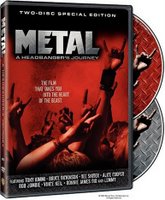
This week Metal: A Headbanger's Journey came out on DVD after a well-received theatrical run. I enjoyed this movie immensely, and I interviewed producer/director/narrator Sam Dunn for Unrestrained! Here's some material I had to cut from the article. I asked Dunn about his experience in Norway, where he filmed a segment on arson and murder-riddled Norwegian black metal scene in the early '90s, and about the fact that another film company has plans to film a docu-drama feature about those events. While the fact that Adam Parfrey (of Feral House Press, publishers of Lords of Chaos, about the rise of the satanic black metal underground) is on board as screenwriter lends some credibility to the project, metal fans will regard the movie with a lot of suspicions and cynicism.
I understand they’re filming sort of a docu-drama about the events in Norway. What do you think about that?
DUNN: "Well, I have mixed feelings about how it's going to portray what happened. I don’t know if it’s going to be purposely set in Norway, or how much they’re going to base it on real events. Who knows? We’ll see. I think it was a captivating story in a lot of ways. It’s hard for a lot of people to believe that it happened. That’s why we felt we needed to do this extra documentary [a DVD bonus segment exclusively about Norwegian black metal]. There was so much more to say than what we could say in the film. It is a part of the history of metal and certainly the anti-Christian sentiment in metal was something we wanted to cover. If we spent more than 10 or 15 minutes in Norway [in the movie proper], it would feel a little bit indulgent or unbalanced. As far as the feature film goes, we’ll see what happens. Maybe the metal community will be up in arms about it. That wouldn’t totally surprise me."
Certainly leading up to it there’s going to be a lot of cynicism.
"Absolutely, and you know what? We experienced the same thing with our film, and we still do. When we post something about the film on Blabbermouth we tend to get responses like, 'Oh my god, it’s got Slipknot and Rob Zombie in it,' and calling me a sellout. It’s amazing. You get that regardless. But thankfully people who have seen the film are chiming in and saying, 'Well, no. You know what? This film is really interesting and it’s respectful and it captures the history of this music' and stuff like that. So thank god some people are coming to our defence. (laughs)"
People are just very protective of their scene, I think.
"I think metalheads are inherently skeptical and fickle. It’s kind of part of the culture because it’s such a part of people’s identity and a part of their lives. I mean, all subcultures are kind of like that, right? It’s like a survival instinct that people have. The only way to keep it your own is to protect its boundaries, you know? (laughs)"
So now that you’ve sampled a few different lives—you’ve got your band [Burn to Black], you’re a filmmaker, you’re an anthropologist—what’s the closest thing to your heart?
"I think that I’m obsessively eclectic, so I want it all. I’m a megalomaniac in that sense. For me, I guess it's two things: we do plan to make a second film about metal that’s going to be looking at the globalization of metal and focusing on how metal has spread to very diverse countries and looking at how different religions and different cultures are affecting the music and vice versa—what this music means and how it is impacting kids in very different environments. Indonesia, Morocco, Brazil, Mexico, Russia, these kinds of countries are very diverse but all have very vibrant or budding metal scenes. I’m certainly interested in doing that, so for now another documentary on metal certainly piques my interest. For the long term I am interested in documentary filmmaking and I would like to pursue it, but I’m also applying to do my PhD starting in September. The idea is to tie that in with the next film, actually. We did feel that with Headbanger’s Journey we really only scratched the surface in terms of all the different places where metal thrives. We only went to Europe and North America, so we feel that we may have been complicit somewhat in painting the picture of metal as being a predominantly white Western phenomenon, whereas in fact it’s much broader than that. I’m really just fascinated in exploring what this music means to kids. I think it has a much more explicitly political slant in many of these countries because many of them are living in very repressive political systems and that kind of thing. Sepultura, for example, is the best known example of that."

1 comment:
You should definitely check it out—very entertaining film, and a great chance to "see ourselves as others see us."
Post a Comment